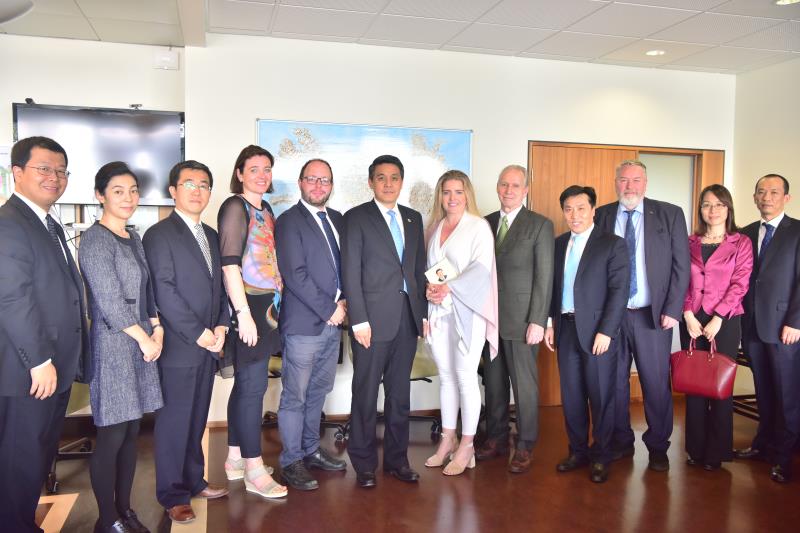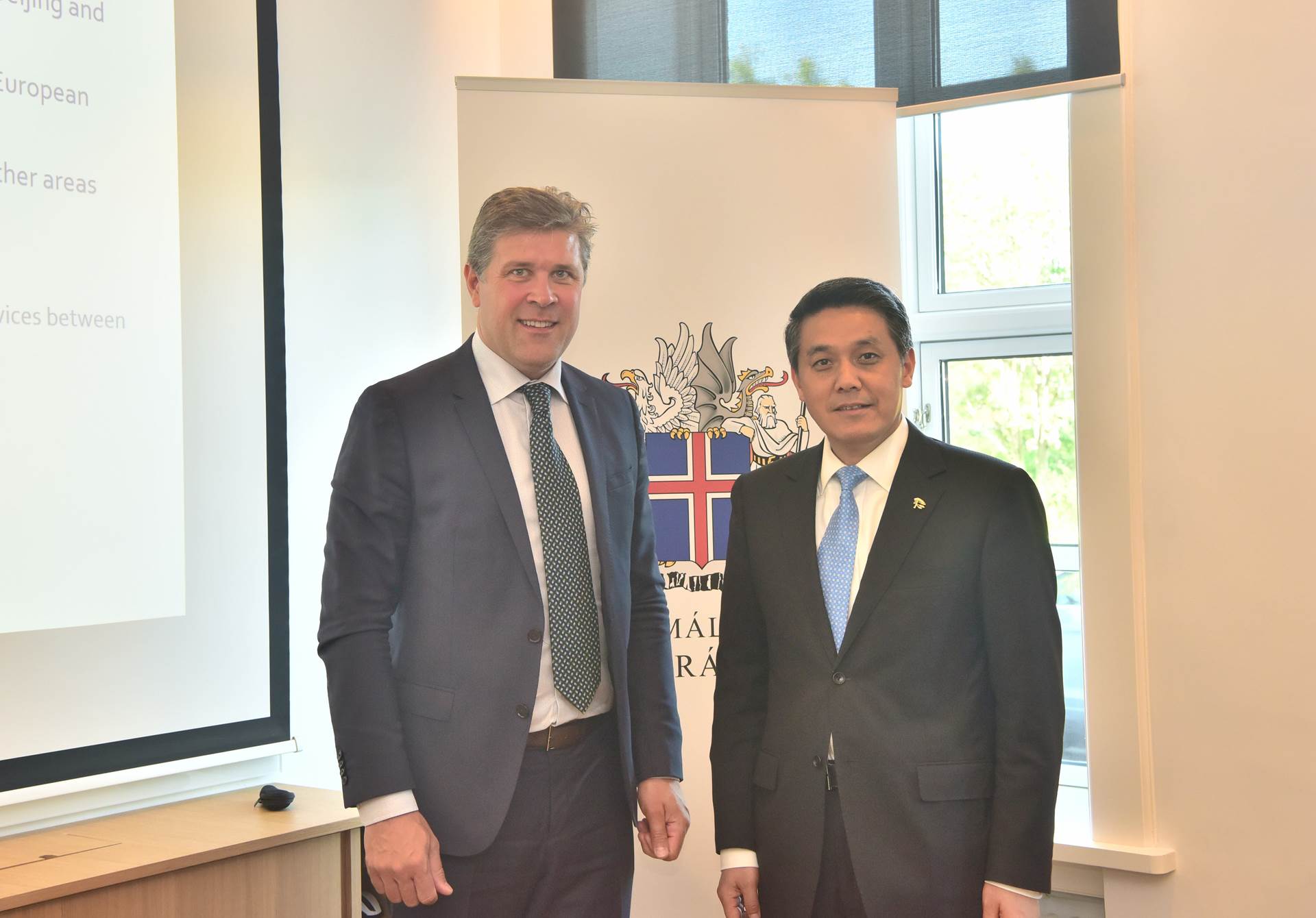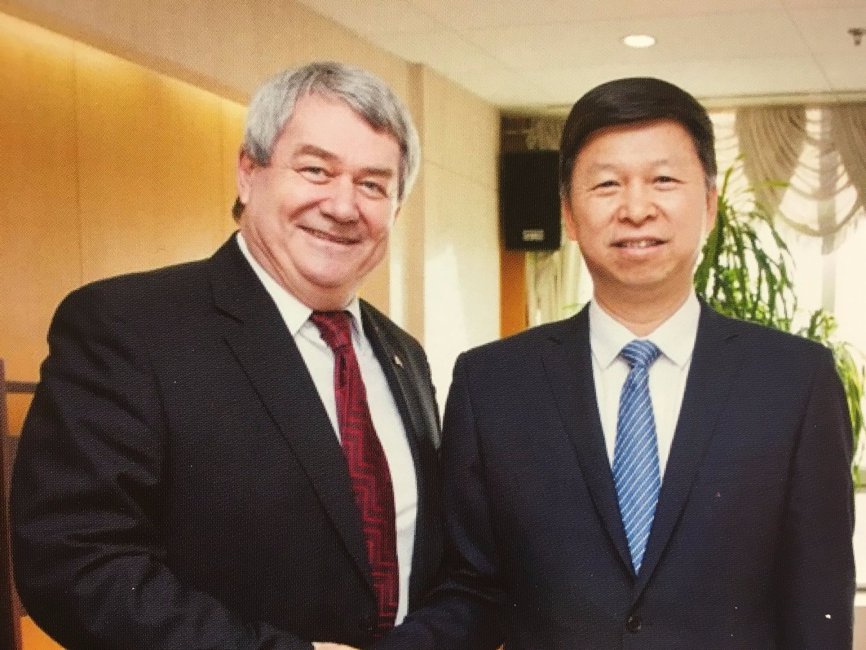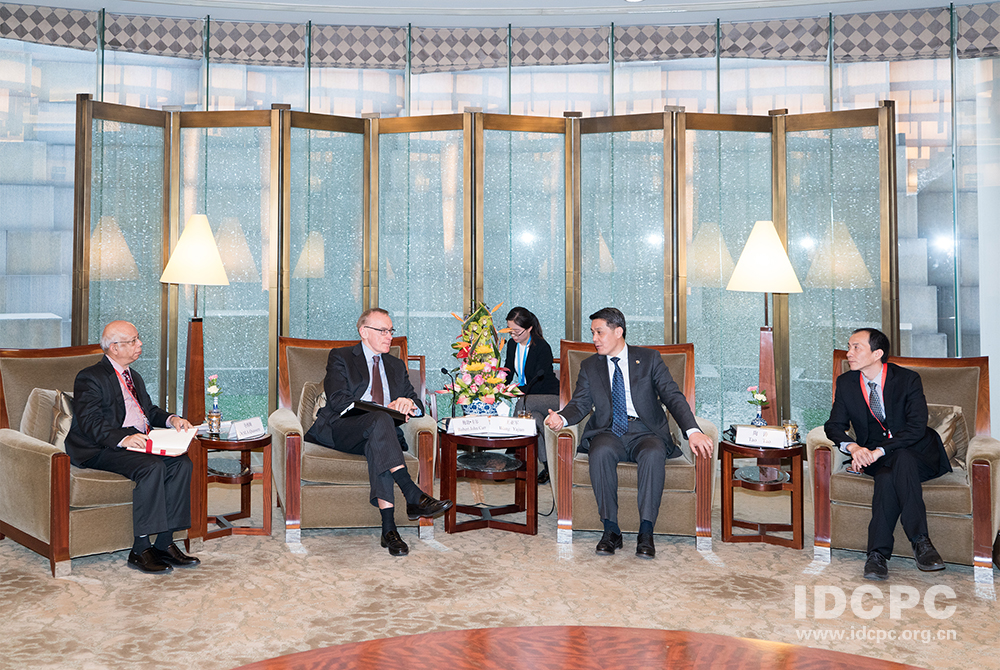The CCP’s efforts to cultivate foreign political parties and generate an appreciative consensus around Xi Jinping’s policies have now reached Iceland. During a visit by the CCP International Liaison Department (ILD, 中共中央对外联络部), Icelandic MPs had a chance to learn about “Xi Jinping Thought” and pose for pictures with a copy of Xi Jinping’s opus magnum The Governance of China.

Two weeks ago, an ILD delegation headed by Wang Yajun 王亚军, one of its vice directors, visited Iceland, as part of a three-country tour that also visited Nepal and Cyprus. The following account of the meeting appeared on 2 August on the ILD’s official website:
At the invitation of Iceland’s foreign ministry, ILD vice-chair Wang Yajun led a delegation to visit Iceland between 31 July and 2 August, meeting with the chairman of the Independence Party [(Sjálfstæðisflokkur)] and minister of finance and economic affairs, [Bjarni] Benediktsson, former president [Ólafur Ragnar] Grímsson, [and] the chair of the parliamentary foreign affairs committee, [Áslaug Arna] Sigurbjörnsdóttir, deepening exchanges with the various main political parties, and promoting and introducing to persons from various sectors of society Xi Jinping Thought on Socialism with Chinese Characteristics for a New Era and the situation of the Chinese side’s implementation of the spirit of the 19th Congress [of the Communist Party].
Xi Jinping Thought or weather talk
While the ILD was quick to propagandise the success of the trip, no public announcement of it was made in Iceland. News about the visit spread among ‘China watchers’ on social media after a few days, originating with the Party Watch Initiative’s Weekly Report, which regularly covers the activities of the ILD and other Party departments.
News eventually reached the Icelandic press. Only after Icelandic journalists had started to work on coverage of the visit did an announcement emerge on the website of the Icelandic Cabinet, a full week after the ILD’s own account.
Representatives of the Communist Party of China, CPC, visited Iceland a few days ago and requested a meeting with Bjarni Benediktsson, the Minister for Finance and Economic Affairs. During the meeting, the CPC representatives explained the party’s ideas for increased cooperation with other countries.
At the meeting, the Minister of Finance and Economic Affairs reviewed the state of the Icelandic economy, developments since the 2008 economic crisis and a comparison with other OECD countries.

DV then reported on the visit, with quotes from participating MPs. Their recollection of the “exchanges” with the CCP cadres differed from the ILD’s official account. None of the parliamentarians mentioned Xi Jinping Thought or the spirit of the 19th Congress. Smári McCarthy of the Pirate Party (Píratar) talked of a “diplomatic reception” with “much talk about the weather”.
Áslaug Arna Sigurbjörnsdóttir, secretary of the Independence Party and chair of the Althing’s foreign affairs committee, told DV that she “spoke openly” to the ILD officials about “the importance of human rights in Iceland’s foreign policy”. The answer she recalls, with the ‘out-of-poverty’ trope, will be familiar to our readers. The CCP’s long-time efforts to dilute the concept of human rights follow the age-old ‘look, puppies!’ recipe: economic growth exists, the people benefit, and any human rights abuses are irrelevant. At the UN Human Rights Council, of which Iceland is now a member, the PRC has garnered the support of governments from Eritrea to Venezuela to pass resolutions advocating the concept of “human rights with Chinese characteristics” Áslaug was likely told about. If anything, Áslaug’s satisfaction that she raised human rights with the ILD visitors only serves to validate the CCP’s claim to hold a ‘dialogue’ where the voice of rights abusers drowns that of the victims.
Unusually for someone concerned with human rights, Áslaug Arna chose to pose for a picture with writings by the head of a human rights-abusing regime. Under Xi Jinping’s apartheid-like security crackdown in Xinjiang, possibly over a million Uyghurs are interned in ‘reeducation’ camps.
Áslaug did not reply to a request for comment.
The finance ministry told Kvennablaðið that human rights were not discussed in Bjarni’s meeting with the ILD. The conversation was about Xi Jinping’s Belt and Road Initiative, among other topics.
Roads of influence
On the same day that news about the ILD meeting reached the Icelandic public, Björn Bjarnason, a journalist and Independence Party politician who was a minister under six cabinets, published an op-ed on China in Morgunblaðið. Titled “Chinese pressure, near and far”, the article calls on Iceland to maintain its indepndence in the face of pressures it can expect once it assumes the Arctic Council chairmanship next year.
Björn’s piece notes China’s interest in becoming a ‘polar great power’ (极地强国), officially proclaimed at Xi Jinping’s 2014 speech in Hobart. He discusses the case of Greenland, where certain aspects of the PRC’s interests, such as CCCC’s possible involvement in airport development and General Nice (俊安集团)’s attempt to buy a derelict naval base, have led to Danish and American concerns. In Iceland, he points to the long-delayed KárhóllChinese-Icelandic Aurora Observatory project, predicting its eventual opening will attract international attention as a sign of China’s assertiveness in the Arctic. Kárhóll will give China “an important foothold” in Iceland.
Björn places the PRC’s Arctic interests within the context of a push for global influence, and mentions the newly introduced anti-interference legislation in Australia.
The CCP’s influence activities in Australia are not, in fact, disjoint from the ILD’s Reykjavík lesson in Xi Jinping Thought. A central role in political influence operations is being played by the United Front (UF) system. A Leninist creation originally imposed on the CCP in the early 1920s, this set of cooptation tactics eventually developed into a major institutionalised area of the PRC political system. Under Xi Jinping, it has gone global. United Front activities are being studied in an increasing number of locations. To mention just three: Hamilton and Joske’s 2017 parliamentary submission provides an overview of United Front groups in Australia; Anne-Marie Brady’s Magic Weapons proposes an influence ‘template’ illustrated in the New Zealand case; Sinopsis and Jichang Lulu’s ongoing collaboration on the CCP’s influence activities in Central-Eastern Europe has described a piece of the Czech United Front puzzle.
The United Front is not, however, the only avenue for Xi’s extension of the CCP’s domestic and diasporic control tactics to the global domain. The Propaganda system seeks to obtain global ‘discourse power’ through tactics that range from attempted extraterritorial censorship to overt and covert propaganda outlets. (An Icelandic version of the latter once attracted some attention.)
From Stalin to Xi
The ILD is another tool of foreign influence. Like other core areas of the political system, the ILD traces its origins to the Soviet management of the world Communist movement. One or more departments governing relations with fellow Communist parties (in power or not) are a feature of Leninist systems. The ILD is similar in name to a secretive Comintern intelligence agency (Отдел международных связей). Post-Comintern, its Soviet analogue was Stalin’s International Department (Международный отдел). The predecessors of the Chinese ILD were Party sections that conducted relations with the Comintern, and later an office whose functions included “researching the revolutionary potential” of Eastern countries and the diaspora. The Department was formally established in 1951. The Sino-Soviet split made it focus on aggressively countering the USSR, supporting splinter groups against orthodox pro-Soviet parties. After the Cultural Revolution, it turned to restoring relations with an expanding circle of Communist and, since the mid-1980s, non-Communist parties. As the DV piece remembers, Geng Biao 耿飚, once an envoy to Scandinavia, visited Iceland in 1979 as vice premier, months after leaving his post as head of the ILD.)
True to its nearly centenary history, the modern ILD still maintains especially close relations with Communist parties, in particular those in power. The current ILD chief, Song Tao, is often involved in high-level contacts with North Korea. While contacts with mainstream politicians are increasingly frequent, the ILD continues to nurture relations with even insignificant foreign Communist parties, such as the Communist Party of Australia (CPA), whose vice president was invited to Karl Marx’s 200th birthday party in Shenzhen, organised by the ILD.
Contrary to the impression some Icelandic MPs seem to have received, the ILD’s functions go beyond weather talk. Shambaugh’s classic study of the ILD lists among its tasks “collecting current intelligence“ on the politics and societies of foreign countries. Brady lists the ILD among the main Party-state organisations recruiting intelligence agents abroad. Gitter and Bowie note the role of the ILD and its front groups in efforts to “constrain” Taiwan’s diplomacy. A candid view of the ILD’s intelligence role was provided in the Czech intelligence service BIS’s 2015 annual report:
In 2015, the dominant Chinese intelligence force in the Czech Republic was military intelligence, whose activities supplemented the efforts of a specific Chinese intelligence organisation, the International Liaison Department of the Chinese Communist Party. This is an agency under the Central Committee of the CCP, whose remit includes, besides foreign relations, intelligence activities.
This assessment has not deterred many Czech politicians from making the ILD their main point of contact during visits to the PRC.
The rise of the New Comintern
Xi’s global expansion of the CCP’s toolkit is accelerating the ILD’s embrace of foreign ‘bourgeois’ parties. However, not everyone wants to play along; in the West, each ‘friendly’ contact achieved with the political mainstream, like the Reykjavík meeting, is still significant. In Western Europe, post-Communist and other leftist parties are still the ILD’s best friends. Last July, ILD director Song Tao and vice director Qian Hongshan 钱洪山 received a delegation from the Party of the European Left, led by Gregor Gysi of Die Linke who heaped praise on the CCP as a model for European left-wing parties to learn from.
In Central and Eastern Europe (CEE), managed by the same ILD bureau as the post-Soviet space, old Communist ties still survive to some extent and provide a basis for the rightward growth of ‘friendly contacts’. The ILD’s favourite interlocutor in the Czech Republic is the Communist Party of Bohemia and Moravia (KSČM, Komunistická strana Čech a Moravy). Last year, the Party’s current Chairman, Vojtěch Filip, listed as an agent under the cover name “Falmer” in Communist-era Secret Police (StB) files, even posed for a picture with ILD head Song Tao 宋涛 for a promotional calendar distributed by the PRC embassy in Prague that highlighted major achievements in the newfound Sino-Czech Friendship.

Like in Iceland, the ILD’s visits to the Czech Republic are sometimes only reluctantly publicised. In November 2016, ILD sent their “assistant minister” (部长助理) Li Jun 李军 to the annual China Investment Forum in Prague, after PM Li Keqiang abruptly cancelled his visit over the growth of local anti-CCP sentiment that followed a series of embarrassing incidents. His sudden appearance was not publicly announced, and even the event organisers were at loss as to his status, apparently not figuring out in the protocol that he was now the most senior Chinese visitor, far above the Chinese ambassador.
Similarly, when Jan Hamáček of the Social Democratic Party (ČSSD), who as Speaker of the Chamber of Deputies is the fourth highest constitutional figure, attended the ILD-organised “Meeting of Political Parties from China and CEE” (中国—中东欧政党对话会) in Bucharest the following year, there was no public record of him even leaving the country. Only after Sinopsis broke the story did sketchy details emerge.
The Bucharest gathering was also interesting in other respects. It was already the second such meeting bringing together representatives from various CEE political parties and ILD cadres. The first one took place in Budapest, Hungary, a year earlier. The Bucharest meeting was attended, on the Chinese side, by Liu Yunshan 刘云山, at that point the 5th-ranking CCP Politburo Standing Committee member in charge of ideology. (He has since been sidelined.) On the CEE side, there was a mixture of parties ranging from the usual (post-)Communist suspects to more opportunistic friends, such as the Polish People’s Party (PSL, Polskie Stronnictwo Ludowe).
All hail humankind‘s shared New Era
Neither “16+1” meeting of political parties was much publicised. They were, in fact, rehearsals for the big-time event, the “World Political Parties Dialogue” held by the ILD in Beijing in December 2017 under a somewhat clumsy title: Dialogue with World Political Parties High-Level Meeting (中国共产党与世界政党高层对话会). This was, in essence, an ILD coming-out party, showing its power to convene representatives of, supposedly, 300 political parties from 120 countries (a full list was never made public). A previously secretive organization came out into the limelight.
The purpose of the meeting was to reach nothing less than a consensus on the future of humankind. That task apparently went smoothly, with a healthy dose of lecturing on the spirit the 19th Congress. Participants got copies of Xi Jinping’s book. The new consensus for the future of mankind was then enshrined in the “Beijing Initiative (北京倡议)”. It “applauds” Xi‘s “full and rigorous governance” of the Party, improving its “ability to govern and lead” and generate “historic achievements” and other desirable effects. Attendees called for “win-win cooperation” before expressing their “heartfelt appreciation” for the ILD.
Two Antipodean visitors to the Dialogue may provide a taste of humankind’s brave new Shared Future. From New Zealand Labour Party president Nigel Haworth, noted for his praise of Xi Jinping’s “wise leadership”, spoke highly of Xi’s “very brave step” as he tries to “lead the world”. Former Australian Labor politician Bob Carr, who now heads a CCP-‘optimistic’ institution set up with UF-linked donations, was also there.

The “summit” illustrated the ILD’s innovative concept of “friendly contacts” without ideological constraints. Unlike its Soviet and Maoist predecessors, the facelifted ILD will not just make friends with Communist and revolutionary parties. In the “New Era”, it will work with whoever implicitly recognises the CCP’s role in a “Community of Shared Future for Humankind”, without necessarily understanding what that actually means. Cooptation tactics become truly universal, with the ILD as a central hinge.
Beyond intelligence gathering and ‘weather talk’, the ILD plays a role in the CCP’s efforts to shape global discourse and build an international consensus endorsing its authoritarian political system. Foreign political parties, from Bucharest to Reykjavík, aren’t its only targets. As the next piece in this series will show, the ILD’s purview within the Xiist discourse-management enterprise extends well beyond professional politics. The propaganda goods Iceland’s MPs delivered to the ILD fall, however, within a newly-normal genre: what Gitter calls “push[ing] China’s vision of the future” with politicians both in power and opposition, building up “reserves of foreign influencers” able to ensure long-term CCP-friendly policies.
All the world’s a stage
After news of the ILD visit became known, Björn Bjarnason wrote a post on his blog, intended as a “supplement” to his Morgunblaðið article on Chinese “pressure”. Comparing the ILD’s official account of the meeting to the explanations by Icelandic participants, Björn notes that the latter might not have been aware that they were “actually taking part in a scene staged on behalf of the Communist Party”. What they saw as a “courtesy visit where they talked about the weather” was presented in China as “promoting Xi Jinping Thought to Iceland’s political parties”.
Plays so staged that foreign and local audiences may perceive them differently are the Party’s trademark. For years, the CCP has sustained such differential messaging in the Arctic, exploiting a general lack of familiarity with China and its political system. If Iceland and other countries in the region intend to preserve their interests in asymmetric relations with China, their political, business and scientific élites may wish to understand their counterparts better. As long as only the CCP knows what’s going on, ‘win-win cooperation’ will mean it wins twice.
[Thanks to Geoff Wade and Anne-Marie Brady]
